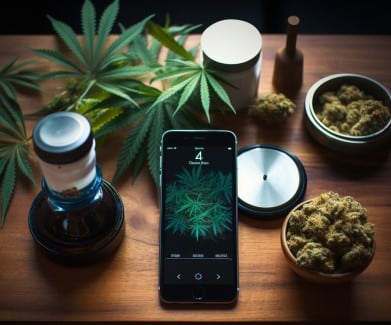The federal government has unveiled its newest testing device to detect for drug-impaired drivers—the Draeger DrugTest 5000—but could your smartphone do the job just as well?
An app called DRUID, which stands for “Driving Under the Influence of Drugs”, is now available to smartphone users for a meagre download cost of just over $5. It claims to help users test for impairment by drugs, including cannabis, by using a serious of games that are designed to test decision-making skills, reaction time, object tracking, and balance.
The test takes approximately five minutes to complete and uses four different games to determine the level of impairment that a user is experiencing while playing.
In order to do the test properly, the user needs to set a sober baseline before starting the official evaluation. This way, the app has a pre-consumption standard to compare the user after they’ve consumed. It can thereby provide a personalized score, which is based on individual performance levels.
Unless the user scores within five percent of their sober baseline score, the app will deem them too impaired to drive and it will encourage them to seek alternative means of transportation.
Although there’s nothing the app can actually do to prevent impaired driving—like locking a user out of their vehicle, for example—it does provide some insight into impairment levels. If used correctly, DRUID users will get an idea of their impairment, or lack thereof, prior to making the decision to get behind the wheel.
DRUID therefore promotes safe, responsible cannabis use by giving drivers the ability to self-assess prior to making any big decisions, which could potentially carry even bigger legal consequences. It could play a role in providing users with valuable insight into how cannabis may affect them and in encouraging them to alter their behaviour in response to it.
And its timing is perfect. After all, in just one month, we can expect a big crackdown in drug-impaired driving enforcement on our highways and roads. Following legalization of weed on October 17, police will be on the lookout for cannabis-impaired drivers and will likely be eager to enforce new impaired-driving rules.
Drivers caught with more than two nanograms of THC in their bloodstream at the time of driving could face criminal sanctions—and the more THC, the stiffer the penalties. Drivers with more than five nanograms in their system will face mandatory fines of $1,000 for a first offence, along with the imposition of a criminal record, and 30 days jail for a second offence.
The severity of these penalties, coupled with the risk of public safety that can be caused by impaired drivers, are two factors that likely inspired DRUID’s creator, psychologist Michael Milburn, to make it in the first place. It is only one of many that we can expect to become available in the near future, as cannabis hits our legal markets and becomes more readily available.
DRUID is an interesting concept and a prime example of simple, accessible technology attempting to fill practical void.
After all, even the Draeger DrugTest 5000—the official police roadside drug-testing device—cannot evaluate or determine a driver’s level of impairment. The Draeger simply tests for the presence of drugs. It does not determine whether or not a person is actually impaired, or affected, by drugs.
DRUID therefore claims to answer this question.
However, it has its limitations.
For example, DRUID cannot actually test for the presence of drugs. For that reason, the impairment that may be detected by the user may not actually be as the result of drug use. Users may be impaired in their reaction time due to fatigue or illness, for example.
It is also important to know that DRUID is not a legal test to determine impairment levels in cannabis users, nor is it an approved drug-screening test. Getting a passing score on DRUID is not a defence to a drug-impaired driving charge. It will not stand up in a court of law.
At the end of the day, this app is little more than an interesting concept and a neat game to play with yourself—so when in doubt, don’t rely on DRUID.
Stay on the safe side and make sober alternative arrangements in order to get around.
















